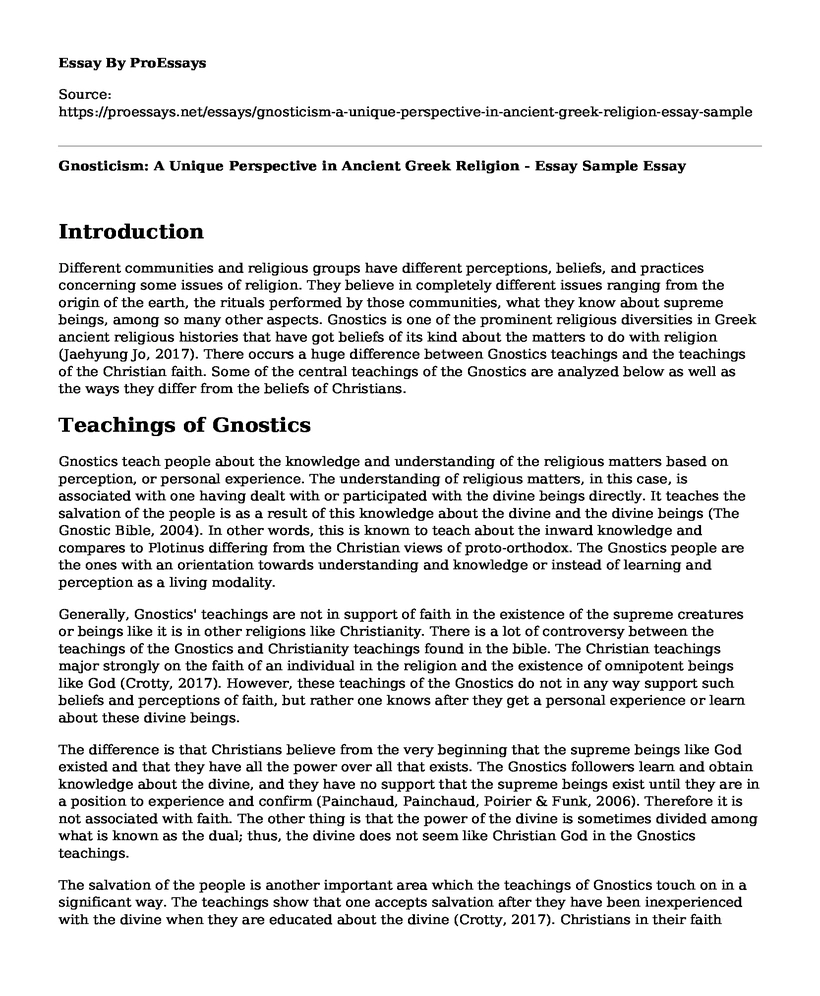Introduction
Different communities and religious groups have different perceptions, beliefs, and practices concerning some issues of religion. They believe in completely different issues ranging from the origin of the earth, the rituals performed by those communities, what they know about supreme beings, among so many other aspects. Gnostics is one of the prominent religious diversities in Greek ancient religious histories that have got beliefs of its kind about the matters to do with religion (Jaehyung Jo, 2017). There occurs a huge difference between Gnostics teachings and the teachings of the Christian faith. Some of the central teachings of the Gnostics are analyzed below as well as the ways they differ from the beliefs of Christians.
Teachings of Gnostics
Gnostics teach people about the knowledge and understanding of the religious matters based on perception, or personal experience. The understanding of religious matters, in this case, is associated with one having dealt with or participated with the divine beings directly. It teaches the salvation of the people is as a result of this knowledge about the divine and the divine beings (The Gnostic Bible, 2004). In other words, this is known to teach about the inward knowledge and compares to Plotinus differing from the Christian views of proto-orthodox. The Gnostics people are the ones with an orientation towards understanding and knowledge or instead of learning and perception as a living modality.
Generally, Gnostics' teachings are not in support of faith in the existence of the supreme creatures or beings like it is in other religions like Christianity. There is a lot of controversy between the teachings of the Gnostics and Christianity teachings found in the bible. The Christian teachings major strongly on the faith of an individual in the religion and the existence of omnipotent beings like God (Crotty, 2017). However, these teachings of the Gnostics do not in any way support such beliefs and perceptions of faith, but rather one knows after they get a personal experience or learn about these divine beings.
The difference is that Christians believe from the very beginning that the supreme beings like God existed and that they have all the power over all that exists. The Gnostics followers learn and obtain knowledge about the divine, and they have no support that the supreme beings exist until they are in a position to experience and confirm (Painchaud, Painchaud, Poirier & Funk, 2006). Therefore it is not associated with faith. The other thing is that the power of the divine is sometimes divided among what is known as the dual; thus, the divine does not seem like Christian God in the Gnostics teachings.
The salvation of the people is another important area which the teachings of Gnostics touch on in a significant way. The teachings show that one accepts salvation after they have been inexperienced with the divine when they are educated about the divine (Crotty, 2017). Christians in their faith argue that Jesus Christ was sent by God to die on the cross for the forgiveness of all sins. With this death of Jesus Christ, everything ended, and those who believe in him are already saved through the blood he shed.
Conclusion
These views about the various religious matters show the diversity of religious practices, the things that are done by the people as well as the perception of divine beings. Some of the teachings of the Gnostics are misleading, and they do not inform about the reality of the universe because most of them are assumptions and not based on facts. The relationship between Gnostics and Christianity is that they all believe in supreme beings with a special power.
References
Choice Reviews Online, 2004. The Gnostic Bible. 42(02), pp.42-0890-42-0890.
Crotty, R. (2017). The Christian Gnostics. In The Christian Survivor (pp. 197-211). Springer, Singapore.
Painchaud, L., Painchaud, L., Poirier, P., & Funk, W. (2006). Coptica - Gnostica - Manichaica. Quebec: Les Presses de l'Universite Laval.
Jaehyung Jo, 2017. The Influence of Ancient Gnostic ideas on Christology in the Gnostic texts of the New Testament. THEOLOGICAL THOUGHT, null (178), pp.53-79.
Cite this page
Gnosticism: A Unique Perspective in Ancient Greek Religion - Essay Sample. (2023, May 02). Retrieved from https://proessays.net/essays/gnosticism-a-unique-perspective-in-ancient-greek-religion-essay-sample
If you are the original author of this essay and no longer wish to have it published on the ProEssays website, please click below to request its removal:
- Agriculture Crisis as a Cause of the Great Depression Essay
- Features of the New Versions of Buddhism Essay
- Greeks & Persians: Cross-Fertilization & Conflict (499 BC) - Essay Sample
- Exploring Japanese Neo-Confucianism: Cosmology & Cultivation - Essay Sample
- Essay Sample on Christians Struggling to Balance Secular and Godly Dynamics
- Essay Example on Heaven: A Place of Belief In Many Religions
- Essay Example on Discovering Spiritual Disciplines: My Journey Towards Closeness with God







